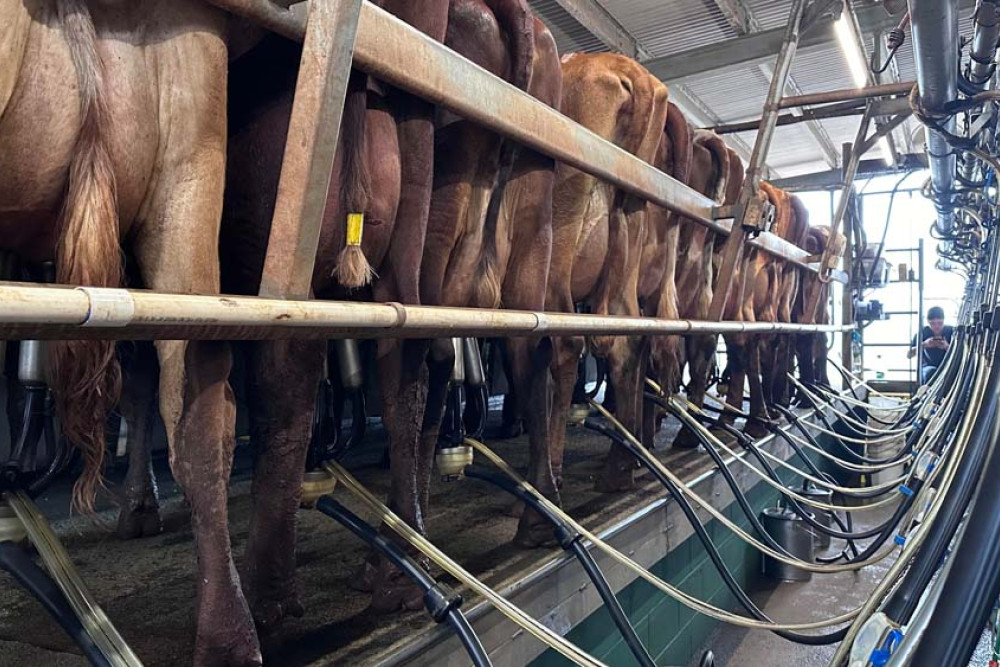On The Land
19 April, 2024
Weather takes toll on local producers
IN what has been a welcome change from “farming mud”, the recent fine weather has provided some reprieve to Tablelands farmers who have been battling the onslaught of the continual wet weather for the past several months.

On the back of last year being one of the wettest on record, some of the region’s industries impacted include the dairy, avocado and hay industries as well as livestock feed merchants.
For eastAUSmilk District councillor and Millaa Millaa dairy farmer James Geraghty, the amount of rain received on his property since the beginning of the year clearly demonstrated why rainfall is measured in “Millaa metres” in his area.
“I have received a bit over a metre of rain for March here on my farm,” James said.
“And a bit over two metres for the year-to-date as at the end of March. There were 26 wet days in March.
“The continual wet weather has been very challenging with mastitis and lame cows, also getting around has been pretty tough.”
Upper Barron dairy farmers Greg and Bronwyn English of Eachamvale echoed similar observations of having also received large amounts of rainfall on their property.
“It has been extremely wet,” Greg said.
“We are fortunate that all our laneways are cement. It would be absolutely terrible to think of what it would be like without our cement laneways.
“It has basically been raining since the beginning of December when Cyclone Jasper crossed the coast.
“With the four months of continuous wet weather, the feet of dairy cattle can become very soft and damage easily.
“We have witnessed a slight increase in the incidence of lameness. It’s important to us to let our cattle walk slowly on the laneways.
"It is also important to always be mindful of overall cow health and to pay close attention to the health of their feet.”
Tableland Veterinary Service’s Dr Ryan Cockrem said the most common issues being seen were foot-related, with animals standing around in mud all day.
“Lameness cases have certainly increased on last year,” Dr Cockrem said.
“With the muddy conditions also comes an increase in mastitis problems in dairy cows.
“Trying to reduce mud, especially in high traffic areas like water troughs, feed troughs and gateways can help with foot problems.”
Several Tablelands avocado growers said the exceptionally wet year had taken a toll on crops.
Avocado trees are very sensitive to heavy rain, a lot of water and water logging.
They had experienced trees either dying or becoming dormant as a result of this.
“Due to receiving all our rain in December, the fruit was immature and could not be picked when we started picking in February,” they said.
Atherton hay growers have also been more heavily impacted than those in drier areas, with even mulch hay, the lowest grade, not being available.
Dunmore Hay and Grain owner Stephen Rockley said he had not been able to cut any hay.
“Now the hay is past the point of prime hay and the paddocks are still waterlogged,” Stephen said.
“Attempting to get onto a paddock to harvest the hay is proving to be extremely difficult due to the paddocks being so wet.
“I need at least five consecutive fine days to be able to get onto a paddock, be able to harvest and then get the hay off and I am not getting that.”
Eacham Stockfeeds CEO Anthony Vanduyn said it was nearly impossible for him to source hay.
“I could not get it locally, I could not get it from out west and I could not get it from down south,” he said.
“The Palmerston Highway was cut which further impacted the day-to-day operation of my business.
“With many of the trucks, some pallets would arrive with varying degrees of water damage.
“Everyone would deny liability for this issue, and legally, I could not sell these affected pallets.
“Difficulty was also experienced with loading product into customers’ vehicles, there is only so much you can fit in the front of a ute.”
Practice principal of Malanda Medical Care, Dr Catriona Arnold-Nott, said many people in the community had work that kept them outside for most of the day.
“Outside work can be very rewarding, but it can also come with special challenges,” Dr Arnold-Nott said.
“Our recent period of prolonged wet weather is one of these challenges.
“It is common for people to experience feelings of low mood or depression in these circumstances.
“It can take some time after the weather has improved before mood begins to lift.
“If you are affected by feelings of low mood, depression, anxiety, hopelessness or despair, please remember that help can be as simple as telling someone you trust how you are feeling.
“For professional help, speak to a nurse or GP at your local clinic or call Lifeline on 13 11 14, or Beyond Blue on 1300 22 26 36 for assistance.”
The website www.takingstock.community is also especially for farmers.


